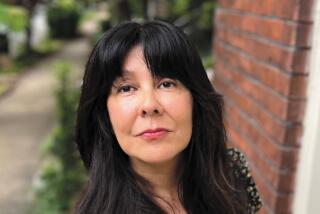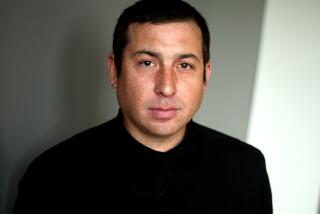Champion of Native American literature
- Share via
In the 1960s, when some in academia still denied the existence of Native American literature, Paula Gunn Allen embarked on a career that proved them wrong -- and altered the required reading lists of literature classes on U.S. college campuses.
The former UCLA professor helped define the canon of Native American literature, encouraged its development by anthologizing new American Indian writers and nurtured a broader audience for the work.
“This is great literature -- American literature,” Allen said in a 1990 article in the St. Louis Post-Dispatch. “What I want from readers is a fundamental recognition that American Indian culture is alive and thriving.”
Allen, a leading scholar and feminist who advocated for the inclusion of Native American voices in the mainstream of American literature, died of lung cancer May 29 at her home in Fort Bragg, Calif. She was 68.
Over three decades, Allen wrote 17 books, including works of poetry, a novel, literary criticism, essays, short stories and works of scholarship. In 1983 she published “Studies on American Indian Literature, Critical Essays and Course Designs,” a seminal work that laid the foundation for the study of Native American literature.
“It was the first time anybody had some kind of a guideline if they were looking to establish a course in native literature,” said Patricia Clark Smith, a professor emerita at the University of New Mexico and a longtime friend. “That was completely her vision.”
With her 1986 book, “The Sacred Hoop: Recovering the Feminine in American Indian Traditions,” Allen broke new ground again, countering the stereotypical view of Native American women with provocative essays examining female deities, the honored place of lesbians and the importance of mothers and grandmothers to Indian identity.
One of the most anthologized essays -- “Who Is Your Mother? Red Roots of White Feminism” -- asserts that early feminists in the United States owe a debt to women of the female-centered Iroquois, who were their role models.
“When Paula was writing this, the portrayal we had of native women was the docile squaw, or the savage woman, as this kind of sexual prey,” said Mary Churchill, a former student and long-time friend who now teaches at Sonoma State. Allen showed the women in crucial roles, vital to their societies.
The work, like much of Allen’s writing, attracted a significant lesbian readership, Churchill said. Though she once identified as a lesbian, Allen said she later realized she was a “serial bisexual,” interested in a certain type of person, unconcerned “if it’s male or a female body,” she said in a 1994 issue of the journal The Circle.
In 1990 Allen received an American Book Award for editing “Spider Woman’s Granddaughters: Short Stories by American Indian Writers,” which the New York Times said was “written with intelligent passion.”
In the 2003 biography “Pocahontas: Medicine Woman, Spy, Entrepreneur, Diplomat,” Allen’s Pocahontas bears little resemblance to the Disney version. The author writes of the young girl as a “beloved woman” -- an honor given to females with spiritual power who are trained from birth in diplomacy and politics of the Algonquin tribe. She is an ambassador whose actions fulfill a prophecy of the birth of a New World.
“A biography of Pocahontas must tell her life in terms of the myths, the spirits, the supernaturals and the worldview that informed her actions and character,” Allen wrote in the introduction.
The book is an example of the way Allen, a fearless, independent thinker, defied convention, Smith said. “And people were always saying, ‘You can’t do that.’ But she did.”
Born Oct. 24, 1939, in Grants, N.M., Paula Marie Francis grew up in Cubero, N.M. Her father, Elias Lee Francis, a former lieutenant governor of New Mexico, was of Lebanese descent. Her mother was Laguna Pueblo, Sioux and Scottish. Allen called her birth a multicultural event.
At the University of Oregon, Allen earned a bachelor’s degree in English in 1966, followed by a master’s of fine arts in creative writing two years later.
Allen said that at one university she wanted to write a dissertation on American Indian literature and that a faculty member told her no such literature existed. At the University of New Mexico, Allen completed the dissertation and earned a doctorate in American studies in 1975.
She taught at several schools, including San Francisco State, UC Berkeley for four years beginning in 1986, and UCLA for nine years as a professor of English and American Indian studies.
In 1999 Allen was awarded the Hubbell Medal from the American Literature Section of the Modern Language Assn. of America -- one of many honors she received. The citation noted her role as a bridge “in making Native American texts accessible and relevant to persons outside her community.”
“I think that Native American literature is useful to everybody who’s trying to move from one world to another,” Allen once said. “And in America, certainly that’s two-thirds of us.”
Allen, who married and divorced twice, is survived by a daughter, Lauralee Brown of Mill Valley, Calif.; a son, Suleiman Allen of Berkeley; two sisters; one brother; and two granddaughters. Son Fuad Ali Allen died in 1972. Another son, Eugene John Brown, died in 2001.
Information on a memorial service will be posted at www.paulagunnallen.net.
Memorial donations may be sent to the Institute for Indigenous Knowledges, 1536 W. 25th St., Suite 120, San Pedro, CA 90732.
--
More to Read
Sign up for our Book Club newsletter
Get the latest news, events and more from the Los Angeles Times Book Club, and help us get L.A. reading and talking.
You may occasionally receive promotional content from the Los Angeles Times.










